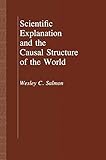Scientific Explanation and the Causal Structure of the World / Wesley C. Salmon.
Material type: TextPublisher: Princeton, NJ : Princeton University Press, [2020]Copyright date: ©1985Description: 1 online resource (321 p.)Content type:
TextPublisher: Princeton, NJ : Princeton University Press, [2020]Copyright date: ©1985Description: 1 online resource (321 p.)Content type: - 9780691221489
- Science -- Methodology
- Science -- Philosophy
- SCIENCE / Philosophy & Social Aspects
- Aristotle
- Bohr, Niels
- Bromberger, Sylvain
- Compton scattering
- Davisson-Germer experiment
- Humean problems
- Jackson, Reggie
- King, John L
- Laplacian explanation
- action-by-contact
- aleatory explanation
- alpha radiation
- behaviorism
- bone, worked
- cancer
- carriage accident
- causal relation
- collective (von Mises)
- contrast class
- disjunctive dilution
- effective calculability
- energeticism
- epidemiology
- expectation
- explanans-partition
- explanans
- first signal, light as
- forecast, reliable
- gambling system
- gravitational radiation
- high probability requirement
- homogeneity
- ignorance
- improbable event
- inferential version
- lambda-definability
- leukemia
- logical empiricism
- magnifying glass
- materialism
- microphysical entities
- microscope
- mononucleosis
- necessary connection
- nonrandomness
- operationism
- pair production/annihilation
- partial entailment
- plausibility
- presupposition
- psychotherapy
- quantum domain
- recursiveness
- 501 23
- online - DeGruyter
| Item type | Current library | Call number | URL | Status | Notes | Barcode | |
|---|---|---|---|---|---|---|---|
 eBook
eBook
|
Biblioteca "Angelicum" Pont. Univ. S.Tommaso d'Aquino Nuvola online | online - DeGruyter (Browse shelf(Opens below)) | Online access | Not for loan (Accesso limitato) | Accesso per gli utenti autorizzati / Access for authorized users | (dgr)9780691221489 |
Frontmatter -- Contents -- Preface -- Acknowledgments -- 1. Scientific Explanation: Three General Conceptions -- Introduction -- Explanation versus Description -- Other Types of Explanation -- Laplacian Explanation -- Three Basic Conceptions -- An Outline of Strategy -- 2. Statistical Explanation and Its Models -- Introduction -- Inductive-Statistical Explanation -- The Statistical-Relevance Approach -- 3. Objective Homogeneity -- Epistemic Relativization -- Randomness -- Homogeneity -- Some Philosophical Applications -- Some Philosophical Reflections -- 4. The Three Conceptions Revisited -- The Epistemic Conception -- The Modal Conception -- The Ontic Conception -- How These Conceptions Answer a Fundamental Question -- Conclusions -- 5. Causal Connections -- Basic Problems -- Two Basic Concepts -- Processes -- The 'At-At' Theory of Causal Propagation -- 6. Causal Forks and Common Causes -- Conjunctive Forks -- Interactive Forks -- Relations between Conjunctive and Interactive Forks -- Perfect Forks -- The Causal Structure of the World -- Concluding Remarks -- 7. Probabilistic Causality -- Introduction -- The Sufficiency/Necessity View -- Statistical Relevance and Probabilistic Causality -- Causality and Positive Relevance -- Causal Processes and Propensities -- 8. Theoretical Explanation -- Introduction -- Causal Connections and Common Causes -- Explanatory versus Inferential Principles -- The Common Cause Principle and Molecular Reality -- The Explanatory Power of Theories -- Empiricism and Realism -- 9. The Mechanical Philosophy -- Logic versus Mechanisms -- Explanation in Quantum Mechanics -- Explanation and Understanding -- The Causal/Mechanical Model -- The Final Contrast -- Bibliography -- Index
restricted access online access with authorization star
http://purl.org/coar/access_right/c_16ec
The philosophical theory of scientific explanation proposed here involves a radically new treatment of causality that accords with the pervasively statistical character of contemporary science. Wesley C. Salmon describes three fundamental conceptions of scientific explanation--the epistemic, modal, and ontic. He argues that the prevailing view (a version of the epistemic conception) is untenable and that the modal conception is scientifically out-dated. Significantly revising aspects of his earlier work, he defends a causal/mechanical theory that is a version of the ontic conception. Professor Salmon's theory furnishes a robust argument for scientific realism akin to the argument that convinced twentieth-century physical scientists of the existence of atoms and molecules. To do justice to such notions as irreducibly statistical laws and statistical explanation, he offers a novel account of physical randomness. The transition from the "reviewed view" of scientific explanation (that explanations are arguments) to the causal/mechanical model requires fundamental rethinking of basic explanatory concepts.
Mode of access: Internet via World Wide Web.
In English.
Description based on online resource; title from PDF title page (publisher's Web site, viewed 30. Aug 2021)


